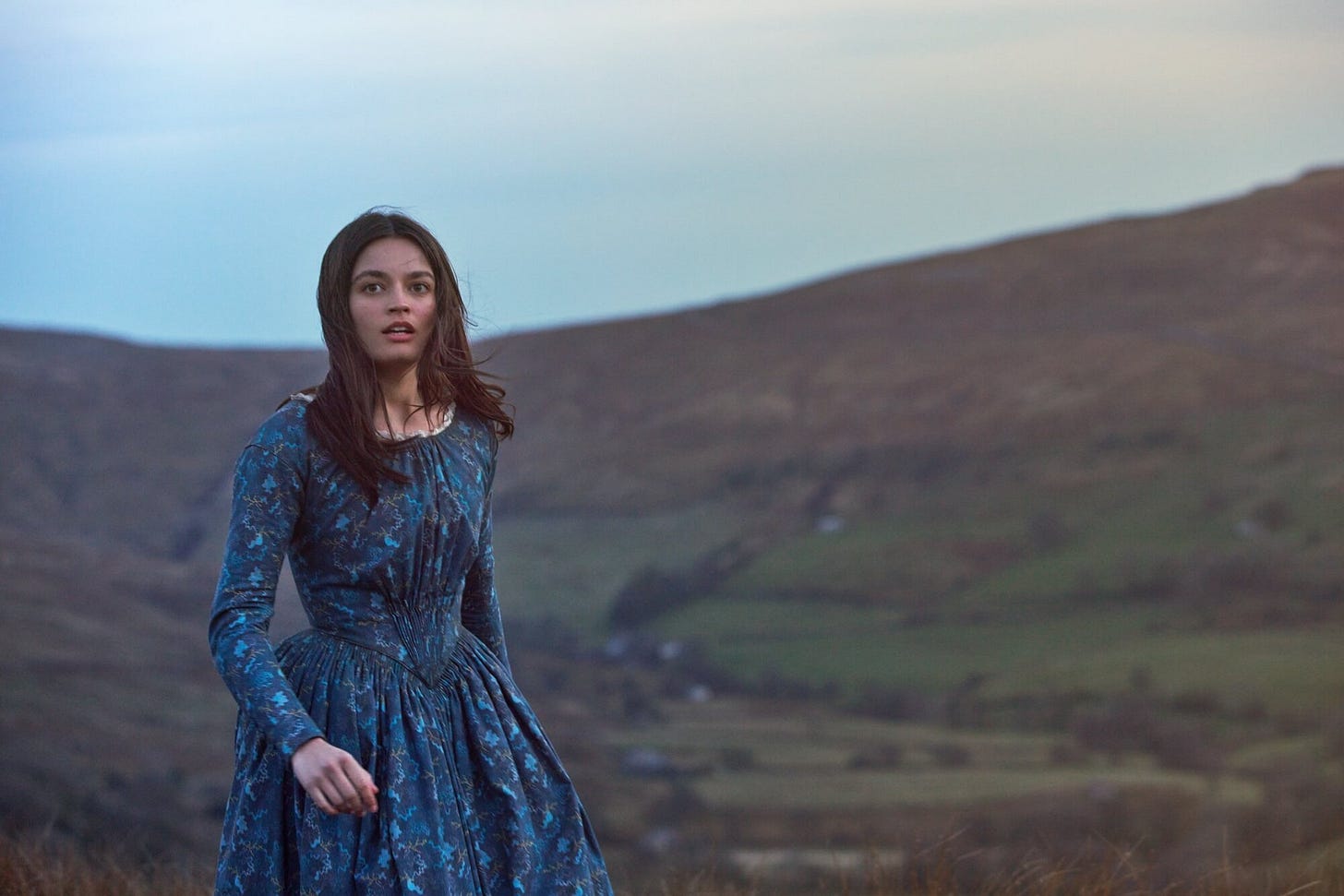Emily In Howarth
My Thoughts on Emily
Not much in the way of concrete fact is known about the short life of Emily Bronte and the creation of her only novel, the Gothic romantic tragedy classic Wuthering Heights, and most of what we do know about her is what people have gleaned through the words of sister and fellow author Charlotte over the years. As a result, anyone attempting to do a biographical account of her life and work is inevitably have to delve in no small amount of speculation in order to tell her story and is clearly what Frances O’Connor has done with her directorial debut, Emily, an intriguing-but-uneven take on Bronte and her creation that avoids some of the typical cliches of the biopic format while indulging in others in a film that doesn’t quite work, I suppose, but still has its elements of interest.
While past films revolving around Bronte, particularly Andre Techine’s The Bronte Sisters (1979), have focused on her relationships with sisters Charlotte and Anne (who was also a writer), this one is more concerned with concentrating on Emily (Emma Mackey) and how she went from being the misfit child of a strict widower father (Adrian Dunbar), who wishes she would get out of her own head and be responsible and productive like Charlotte (Alexandra Dowling) and Anne (Amelia Gething). She is more of a romantic fabulist who is more closer in spirit to her brother, Branwell (Fionn Whitehead), another free spirit who does not want to play by society’s rules. While Branwell’s path leads to alcohol and opium, Emily’s soon leads to the new local curate, William Weightman (Oliver Jackson-Cohen), a brooding, yet initially standoffish, young man who first serves as her French tutor and then becomes her secret lover. All is well for a while but before too long, his terror of the intensity of her feelings towards everything and his own cowardice lead him to cruelly betray her, a move that breaks her heart but which, along with Branwell’s concurrent downward spiral, inspires her to take pen to paper, the results of which can still be experienced in high school lit classes to this day.
In creating this narrative, O’Connor is clearly taking a lot of liberties (while Weightman was a real person, there is not much in the way of evidence to suggest any kind of romantic relationship with Emily) as a way of exploring the emotional truth behind Emily’s life and work as opposed to offering up a dry recitation of facts that feels more like an adaptation of her Wikipedia entry than anything else. This is most clearly evident in the film’s most striking scene, a sequence in which the Bronte siblings and William perform a faux seance using a theatrical mask as an alleged spiritual conduit and Emily, when prodded to take her turn against her will, conjures up the ghost of her dead mother as the winds outside on the moors howl and the windows blow open in dramatic fashion. On the surface, this may seem like an odd diversion but as a way of illustrating one of Emily’s key gifts as a storyteller—the ability to convey a theoretically ludicrous story with such passion and intensity that one cannot help but get swept up in the giant emotions she is conveying through her words—it proves to be marvelously effective.
If the movie had contained more moments like that, Emily might have become a somewhat more sedate version of those off-the-wall biopics (for lack of a better word) that Ken Russell used to make back in the day in which he went to wild (and sometimes potentially libelous) stylistic extremes to put viewers into the mindsets of his subject. However, O’Connor dials back on this approach and while the film does not entirely get stuck in the standard biopic rut, it does get more conventional as things go on and the focus shifts to underlining the ways in which the upheavals in Emily’s life become fodder for her book (including being chased through the moors by dogs on a couple of occasions). Other aspects—such as the book’s actual writing and publication and Charlotte’s negative reaction to it—are glossed over a little too quickly and lead to an ending that feels too rushed and meandering to have much dramatic impact.
And yet, while Emily is undeniably uneven at times, it still makes for an intriguing debut behind the camera for O’Connor. The film is visually striking throughout and she does a decent job of examining her subject without simply indulging in hagiography. In the latter regard, she is ably assisted by Mackey, who delivers a strong and stinging performance as Emily with an intensity that practically burns through the screen as it transforms her from a long-gone literary icon into a living and breathing person who was cursed with wild emotional torments but blessed with the gift of being able to process them into a work of literature that is just as vibrant and powerful today as it was when it first came out. If nothing else, Emily will no doubt inspire viewers to go out and give Wuthering Heights a fresh read and that, if nothing else, is enough to justify its existence.


